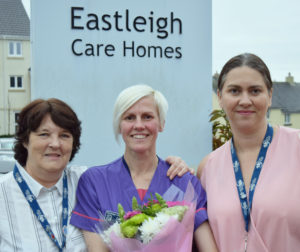
Excellent Care needs to be applauded
Carole Anne Langmead, from Barnstaple, in Devon, is a Health & Social Care apprentice who scooped a prestigious national award. Coming in 4th place, she was highly commended by the judges at the World Skills competition.
I was delighted to learn of Carole’s achievement, so often my focus is on the failings and not the many successes of the care sector in the UK. With this in mind, I took the chance to interview her.
Carole is retraining, having previously worked with pre-school children in a nursery environment.
I asked Carole..
A move from working with very young children to elderly people is quite a transition. How did it feel to you initially?
“I’ve worked in care for about 3 years now. In some ways it’s very similar to working with children; you’re still caring for people. I just feel like I want to look after people whatever age, but I wanted to work with a completely different age spectrum, which is why I chose to go into elderly care. I didn’t realise how much I would love it.
What do you specifically enjoy about working with older people?
-“Listening to their history, making a difference. I could spend all day talking to people about what they’ve done in their lives. It’s rewarding, so I get something out of it myself – it works both ways. I enjoy building relationships – within professional boundaries, of course; you can’t get over-attached.”
How did you come to enter the World Skills competition, and am I correct in thinking it is the largest skills and career event, showcasing a huge range of workplace skills across a broad range of industries?
-“My assessor, Theresa, put me forward to Annette, the Health & Social Care team leader, at Skills Group (my training provider). We went from there. They were pleased with my work and saw something in me that I didn’t, which I’m really grateful for.”
You had to attend a two day residential course in Yorkshire as part of the process. What was the most interesting thing you learnt on the course?
It’s hard to pick two – it was all so interesting, I was in awe. I particularly enjoyed stoma care, wound dressing and basic First Aid.”
How did you feel when you learnt you had reached the finals?
-“Ecstatic, I couldn’t believe I’d got that far. I didn’t know what to expect! I really didn’t think I’d end up coming highly commended.”
Your final judging day was in Birmingham? What did you most enjoy ?
-” Being able to demonstrate my own personal skills in the way that I deliver care. I was able to put my own stamp on it.”
You did amazingly well to come 4th out of the original 80 entrants. What do you think set you apart from the others and how did you feel?
-“I think it was the unique way that I approach care. Theresa has always said I’m a people person – maybe that’s why. I was sat in the audience waiting for the results to come in with baited breath. When I saw my name come up on the screen I was over the moon, really pleased.”
You now have the prestigious role of “World Skills Ambassador” – what does this involve on a practical level?
A brief overview – A brand ambassador – talks to schools and gives presentations
What do your family, friends, colleagues, and “clients” think of your success?
-“People are really proud that I’m there to help them. Friends at work have been really supportive and my mum was forever cutting out pieces in the North Devon Journal. My husband and daughter are really proud too.”
The media often focus on the instances of neglect, abuse and poor care. How does this make you feel as an example of an excellent carer?
-“We’re not all the same – there is a lot of negative press on care and carers. Instances of neglect, abuse and poor care really frustrate me.”
The problems facing the care of our elderly and the struggling care system is now being widely discussed in the media. What are your thoughts? Do you have any ideas or solutions?
-“There are a lot of difficulties facing our social care system – waits for care homes are getting longer and that’s having a knock-on effect on the NHS. I do know that the government are investing £2bn over the next few years, but it’s not all about money; best practice is so important. We need long-term solutions.”
What do you feel are the natural qualities a good care giver needs and how important is good training?
-“Carers need to be compassionate and empathetic. Each person is an individual with their own needs and desires, and their own ideas about what they want out of life. They’re not all the same just because they’re in a care home!”
My training with Skills Group has given me the confidence to deliver care in the best possible way that I can – they’ve been great throughout and I would recommend them to anyone looking to up skill or retrain like I was. The support I’ve received from Theresa and Annette has been amazing.
Where would you like your new career to take you? What is your ultimate ambition?
-“I’ve now been asked to deliver training at work. On National Dignity Day, I trained 64 members of staff alongside two nurses, and really got stuck in there. There were 7 or 8 different workshops. Now I’ve got the confidence, I’d like to get my Assessor for Care certificate – who knows where this could take me! But most of all I just want to care for people.”
To find out more about Apprenticeships with Skills Group call 0333 999 2000 (free from mobiles and landlines), visit www.skillsgroupuk.com or www.apprenticeships4me.com.
